by SeanBreathnach | May 17, 2014 | featured, Festivals, Screening, Short film
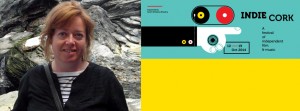
Una Feely
This week we had the pleasure of chatting with Una Feely. Una co-founded IndieCork Festival in 2013, the only arts Co-Operative in Ireland. The festival focuses primarily on independent film, media and cross-platform arts. Her background is in programming and arts management. From 1991 – 2013 she worked with Cork Film Festival. She has programmed Irish film showcases for many international festivals from Lisbon to Liverpool. She participates on the Board of Directors of the Crawford Gallery, and the directorate of the International Short Film Conference.
Hi, Una – thanks for taking the time to chat with us. We will start with the broadest possible question: What do you look for in a film?
It’s hard to define, as short films in particular throw up so many surprises. I’m always looking for films that move me in some way. These kind of films come under the heading of ‘films that had to be made’. I’m also looking for films that are fresh and innovative – not necessarily experimental, as I’ve chosen many narrative dramas too over the years. I think it’s more about the treatment a filmmaker gives their film – the nuances, the subtleties and the intentions behind it. And then how successful it’s been at getting that across into one coherent piece of work. That doesn’t necessarily tie into fabulous technical achievement either.
What advice would you give to filmmakers hoping to maximize their chances of getting their films into festivals?
You can make a great film but send it to the wrong kind of festival, one that doesn’t focus on your type of work. This is so disheartening for filmmakers, so I would say do the research on which festivals might suit your film – what kind of work have they selected before, read between the lines of their entry form and their website statement. Often you will find some hint as to the kind of film they think is worthy. Find out which festivals are genuinely respected, where getting selected will be a real honour and something taken seriously. Don’t be disappointed if your film doesn’t get into Cannes or Venice, very few do! Rejoice if it gets into even one decent festival, someone has identified with your film and appreciated it. Present your film in a professional way, making it easy for the festival to process it and play it.
Finally, before sending your film out, do get a few genuinely independent opinions on your film, so that you know the film might travel well.
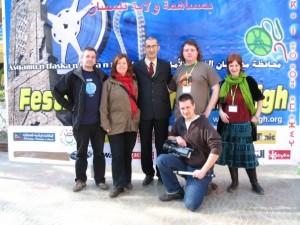
Sometimes I think that the shorter a short film is, the more likely it is to get screened by festivals. Do you think that’s true?
Actually I think the heyday of the 3 minute short is gone. That said, we had some amazing very short Japanese animation at IndieCork last year. Very short films are quite hard to find now, except for animation. It’s good to have a mix of lengths from the audience point of view though and that’s one reason festivals like them too, so they are seen as more ‘programmable’ In general I think short films have got longer, 20 minute films are almost standard. Sometimes a longer length allows the filmmaker to create a stronger more lasting statement. Generally, adding length to a film can damage it badly I think – and the best rule is to make a film the length it needs to be, nothing more.
I noticed in your previous selections that you place a great emphasis on the quality and diversity of the films you program. How do you source these films with an eye to keeping the quality of the programme so high each year?
Thank you! I suppose it’s a competitive process for one thing, so last year IndieCork received 3,000 plus entries. Viewing all of these was difficult logistically, but it pays off when it comes to rounding it down to roughly 50 films. Then you really see the quality coming in and the feeling that each film has won it’s place in the programme. The shorts selection should be a look at the best of what’s happening internationally and at home. You do have to care how the programmes are put together, and think and practice different combinations in your head at least.
What is your approach in working with the film selection committee to choose movies? Are there any battles over specific films?
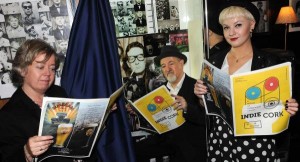
Last year the people selecting films were from diverse backgrounds and this contributes to the mix of films selected. For example we had a Canadian film expert working away independently sending in her reviews and we also had festival directors from well regarded international festivals contributing. Locally, there was a small army of interested and knowledgeable contributors. This was the great discovery for us, that on our doorstep there is invaluable talent and support and a real cinema constituency keen to contribute to IndieCork. We do discuss some films indepth and at length. Generally I’m in favour of the ‘if you love it we’ll try to screen it’ approach, so long as you can shine some light on a film that others maybe can’t see the merits of immediately. So there is some convincing to be done at times, but if somebody genuinely has a passion for a film, it deserves to be listened to. There are always 10 other festivals that could have happened in the unselected pile each year.
In your view, what is the role of a film festival?
Big question! Firstly I think a film festival is a celebration of a few things – of film, of an audience coming together, of those that make films and of the community they’re based in. There’s a great bit of magic that can happen if it’s done well. Everybody has the sense of investment in it; the filmmakers, the organisers, the audiences and the industry. it should be a genuine showcase for filmmakers – an opportunity to present their work, and to get feedback and interaction with an audience. A festival should provide access and opportunity. There is so much happening in independent film and so little of it seen, and yet Cork has this great appetite and appreciation of film. At IndieCork we’re trying to instill this into how we work, a sense of Cork celebrating independent film and creativity. We’re also keen to bring a bit of fluidity back into the scene. The festival template can become very staid, with financial pressures and tourism statistics dictating activities. There is a tendency to plough the same path again and again, as that’s what is being asked of you by the funders. IndieCork will certainly do our best to avoid that. On a basic but important level, festivals contribute to the quality of life where you live.
Have you any thoughts or advice regarding Irish films or films made here in Cork?
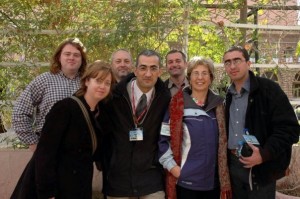
I think great development has happened in Cork on the film scene over the past decade. It would be good to see that continue, despite the very centralised focus on filmmaking in Dublin. I would worry about investment in Cork, and the Arts Council decision not to fund Cork Film Centre is a blow to many people. It will just simply make it harder especially for those new to the scene, to gain access to equipment and training. So perseverance is so necessary for anyone determined to make films in this climate. I think the emphasis from funders has been to support films that are determinedly making their way to a particular marketplace, usually focused on the U.S. No disrespect to these filmmakers, but I’m more interested in the personal and individual approach to filmmaking, story-telling, experimentation, whatever the area you’re interested in. I don’t think that the films we make as a national cinema have a very personal focus but again there isn’t the sheer volume of filmmaking here. The flair, vision, imagination and individuality that you see in short films, isn’t generally coming across in feature filmmaking. Last year at IndieCork, we found some exceptions to this in the new Irish features we presented, these filmmakers were all working outside of mainstream funding and perhaps that was liberating in exploring their own path. The budget is the aesthetic, as the great producer Christine Vachon says. Locally there is now a foundation of filmmakers in Cork, engaged and producing good work. I think opportunities to think outside of what you know are invaluable; seeing international films at festivals, meeting delegates and seeing what’s happening internationally (not just the U.K. and U.S.) all really helps to widen the scope of the work. I’ve noticed a correlation between filmmakers who will spend a week at a festival taking in all the international shorts programmes, and those making good work.
What can we expect from this year’s Indie Cork Film Festival?
We have a lot planned! We have been developing the idea of IndieCork for one thing. We see the festival as a fluid concept in terms of presentation, so we’re looking at events that you would call cross-platform in that music, film, performance and other elements are involved. We have of course at the core, film. We’re working with a couple of international agencies on presenting specific work and themes, all to be revealed late Summer. We’re again putting together some workshops that we think are relevant and important. Last year, Niall Owens put these together and did a great job, so Niall is back this year with renewed ideas and plans for that element. Our first year was pretty much an exploration of what could be created in six months. So 2014 will offer a more fully rounded festival – on a budget of course! We’re working in partnerships of different scales too; locally with a lot of creative producers and internationally with agencies and festivals and filmmakers. 2014 will see our partnership with Heritage Pubs and their venues blossom out in a central part of the festival too. We’re looking forward also to bringing some exceptional talent to Cork, people with a lot to offer both the audience and the filmmaker. Plus, IndieCork is always going to be rooted locally. The team here is available to connect with anyone with a good idea; that mercurial element is something we’ve instilled to the fabric of the festival. Mick Hannigan is not hard to find about town! …and the rest of us aren’t far behind him either, so get in touch; IndieCork 2 is coming!
For further information on IndieCork, or if you wish to submit a film to IndieCork, check out: http://indiecork.com/
and: http://www.facebook.com/IndiecorkFilmFestival
by SeanBreathnach | Feb 8, 2014 | Uncategorized
It has been a while since our last interview, so today we have something special – an interview with Rupert Maccarthy-Morrogh, DP, director and owner of Cork’s own Studio 5108.
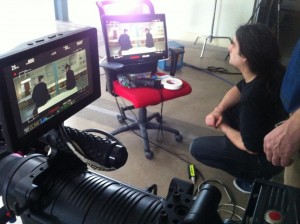 Hi Rupert, and thanks for taking time to talk with us. First off the bat, can you tell us a bit about how you got into this line of work?
Hi Rupert, and thanks for taking time to talk with us. First off the bat, can you tell us a bit about how you got into this line of work?
By trade (as in college and my 20’s) was spent working as an audio engineer, I only got seriously into film in my early 30’s, I was working in a web company at the time and we started creating web promos for our clients, from there I started doing shorts etc.
Moving from sound to picture wasn’t really a huge jump, deep down they are quite similar artistically and technically (in terms of head space). It does mean I am not impressed when the sound dept. get in my shot.
Where did the idea come from for Studio 5108?
I had a smaller space in the city, just for warehouse space. We started to use the back room as a (tiny) studio and the idea for 5108 grew from there. Declan Casey from Standpoint.ie and I believed a real studio would be a great base for our work and maybe kick-start some more production in the county.
I know you’ve done a lot of work in lighting, and recently served as DP on the feature film: Treekeeper. Was it a natural progression moving from lighting to cinematography?
It was really the other way round. When I first started shooting, the lack of serious lighting equipment in Cork meant I invested (a lot) in lighting for my own projects. SLR.ie, our lighting rental company was a natural progression from there.
Who would be your influences in the area of lighting and photography?
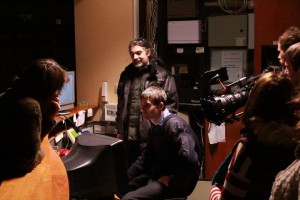 Conrad Hall would probably be my favourite DP, followed by (in no particular order) by Christopher Doyle, Guillermo Navarro, Roger Deakins, Matthew Libatique – the full list is very long!
Conrad Hall would probably be my favourite DP, followed by (in no particular order) by Christopher Doyle, Guillermo Navarro, Roger Deakins, Matthew Libatique – the full list is very long!
Have you particular advice you could give to people starting off in lighting and film?
Best advice I ever heard:
Turn up early, don’t sit down, act like you give a damn and shut the F@$k up
You also recently directed the feature film: Storage – how did you find the move from DP to director?
Weird but very satisfying. Luckily I have a great DP in Ian D Murphy, also perhaps oddly I gaffed for Ian on Storage, so I could hide in my ‘Happy Place’.
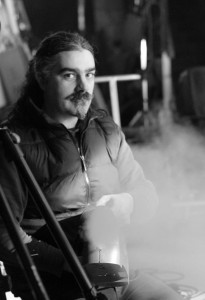 Can you tell us a bit about the movie?
Can you tell us a bit about the movie?
Yes, but not yet 🙂
1st ‘Storage’ trailer in the next few weeks
Were there any particular challenges or benefits to shooting ‘Storage’ and ‘Treekeeper’ in Cork?
Disadvantages:
Cork is my home and I love it dearly, but its not really set up for production. People think you are either:
(a) A bunch of crazies shooting amateur shorts on a handy-cam.
(b) Hollywood types with loads of money that you would like to give out.
I see no reason why Cork can’t create world class cinema, but the support processes from ‘the powers that be’ are actually being eroded eg, non reappointment of the film commissioner, the funding cuts to the film centre.
Advantages:
A bunch of dedicated people trying their hardest to create a sustainable film industry in Cork, for example: The lads in Epic, Sean O’Conner, Paddy O’Shea, Brian Cronin, Conor Slattery, Simon Mckeon, St John’s, The UCC Masters course, Egomotion, and Us! (If I left people out, its because I haven’t had coffee since this morning)
Have you any future secret movie making plans that you wish to reveal to the reading-several?
I have, but they’re secret…
All joking aside my writing partner, James Browne and I have three scripts in the works, and we are vaguely open to scripts from others (1 pagers only please folks).
For further information on Rupert and Studio 5108: http://www.studio5108.com/
For lighting & equipment hire: http://slr.ie/
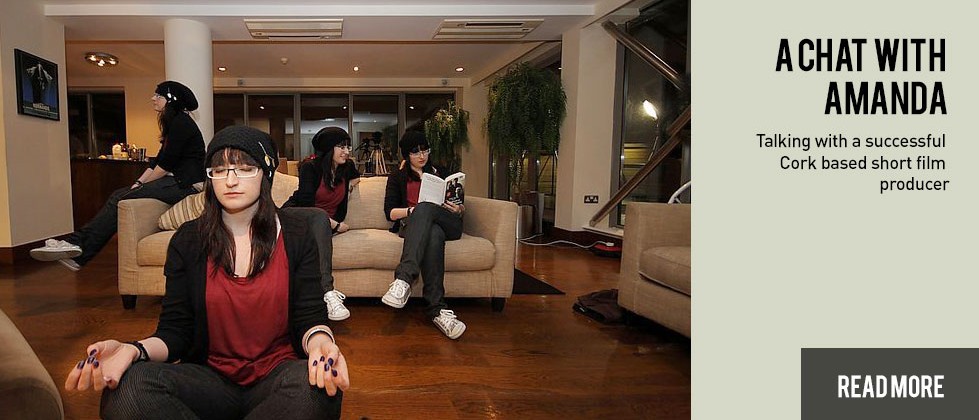
by SeanBreathnach | Nov 23, 2012 | Education, Producing
[image_frame style=”framed_shadow” align=”left”]http://egomotion.net/wp-content/uploads/2012/10/amanda1-179×300.jpg[/image_frame]
A Chat With A Cork Based Movie Producer
Amanda Ferriter began working in Theatre Production in 2004. She has worked as a Production/ Stage Manager with various companies including Cork Opera House), Guiness Jazz Festival, St Patricks Festival, Opera 2005, Yew Tree Theatre and Cork Midsummer Festival. In 2005, she working with the Scottish production company GridIron in the Edinburgh Fringe Festival. She recently stage managed a national tour of Verdant Productions ‘Guerilla Days in Ireland’. Amanda has also produced the award winning short films ‘Heart’ and ‘Partly Cloudy’ by Mark Cogan, ‘Gemma?’ by Kevin O Neill, ‘Mutt’ by Shaun O Connor. She was also co-producer of Liam Delahunty’s ‘Tom’s Sceadu’. Her current project is ‘The Nymph’ by Damian Byrne.
What is the best part of the job?
I honestly can’t pick one part of the job that I prefer over another! I love being on set and seeing what is on the page come to life, from the very first take to wrap its great watching the story unfold in front of you. Being the producer, most of your prep work is done so you have time to be on set and soak up the atmosphere! Another part I love is having the first public screening. Sure its nerve-racking not knowing how it will be received but ultimately people getting to see the short is one of the reasons why we make them. There’s no point in working hard for a project to sit on your computer for no one to see.
What is the worst part of the job?
The worst part for me is asking people to either work for free or at a reduced rate. There are so many talented people in the film industry in Cork but unfortunately there are not enough funding resources for everyone or for the amount of work being produced. Yes there are things like Fundit and kickstarter but it seems to me that the majority of projects are self-funded. I’d love to be able to pay everyone what they deserve, sometimes that’s just not possible. You do the best you can with your budget, but there can be times where you have to postpone the project and wait until you raise a bit more funding or you can scrap it… That’s never an option!
Leading up to a shoot – how much preparation do you do?
I would do a lot of the preparation leading up to a shoot, from finding locations, crew and sometimes cast (usually directors have some actors attached already or have people in mind for the roles) to organizing the schedules, logistics, catering, dealing with budgets, hiring equipment and arranging insurance. I’d liaise with each HOD to ensure that they have everything they need before getting to set. A lot of people say I’m crazy for liking the production side of the shoot but there’s a huge sense of satisfaction when you can make something come together.
[image_frame style=”framed_shadow” align=”left”]http://egomotion.net/wp-content/uploads/2012/11/IMG_7399-300×200.jpg[/image_frame]
What do you want from a Director? What is the ideal relationship?
Mutual trust and understanding. It’s so important to have that in the director/producer relationship. For a director, you are trusting someone to bring all the elements together. As a producer, you want to do the best you can so that what ends up on screen is what the director envisioned. Yeah there are times where you have disagreements where one person doesn’t want to budge on something, whether its a creative or budgetary issue, so you look at the bigger picture, find a compromise and do what’s best for the project. The Director and Producer want to create something that people will enjoy and they have to be on the same page for that to happen. They spend a lot of time together and talk numerous times a day in the lead up to a production so you have to get along on a friendship level too. I’ve worked with some really great Directors and I’m glad to call them my friends.
What was the biggest challenge regarding your most recent film?
The short film I’m currently producing (The Nymph by Damian Byrne) is proving to be the most challenging! It’s a night shoot with a few effects so making sure every detail is thought through carefully and planned properly is essential. We have an extremely small budget but its such a great story that it needs to be put on screen. We’re filming over 2 nights in an amazing location but if it rains, we’ve no choice but to postpone until early 2013. My main challenge on this however is having a tiny budget so we have to beg, borrow and steal in order to get it done. There are some amazingly talented people attached to it so as long as the rain holds off and I can put everything in place, I know something great is going to be created, despite the lack of a big budget!
[image_frame style=”framed_shadow” align=”right”]http://egomotion.net/wp-content/uploads/2012/10/amanda21.jpg[/image_frame]
At what point does the producer divorce themselves from a project?
For me, I’d take a step back once a project has been screened in a few festivals. After a film has been completed, I’d discuss with the Director what festivals to submit to. We’d work towards getting it screened in as many as possible, that can take longer than a year but once we feel that its had enough screenings, I think its time to put it up online for a wider audience to view it. With ‘Heart’, I wouldn’t let Mark put it online for at least a year and it was quite successful on the festival market but the online views have so far exceeded over 80,000, its far more than we could of hoped for and we are delighted with. You can stop working on a project but you never really divorce yourself fully as there’s always a sense of pride in something you’ve worked so hard on.
Who would you say your biggest inspirations are in the film world?
What inspired me to get into film was (and people may laugh at this reply but..) Lord of The Rings. I was in New Zealand in 2009 and went on a daylong tour of the filming locations around Wellington. It was really fascinating to see how they took a patch of green by a housing estate and turned it into the gardens of Isengard! I’ve always been a huge LODR fan ever since the movies came out and I used to watch the ‘making of’ more than the films themselves. When I got back to Cork, I started looking at my options and as film had always interested me, I decided to enrol in the St John’s film course. As for any favourite Producers or Directors, I don’t have any, as there are so many that I like. I don’t have a favourite genre either but I am fan of sci-fi and fantasy books and films and would love one day to be able to produce or be involved in making that genre of film here in the south of Ireland. Its great to have favourites but I like to be open to all films and genres.
What is your impression of the film industry in munster, and in particular in cork at present?
[image_frame style=”framed_shadow” align=”left”]http://egomotion.net/wp-content/uploads/2012/11/LIT_film_fest012.jpg[/image_frame]
The film industry in Cork is great at the moment! There are so many talented cast and crew producing amazing things. For a county that doesn’t have much funding available to us, the output of good quality work is incredible. I could list people but I’d be here for ages! There’s a great ‘can do’ attitude among everyone at the moment and a lovely camaraderie with people willing to help each other out too. I think its going to take another few years before we see big budget films frequenting the city and county but I hope it will get there eventually. The ‘important’ people are beginning to take notice of the talent and facilities available here and as long as we keep going as we’re going, its for our and future film makers benefit.
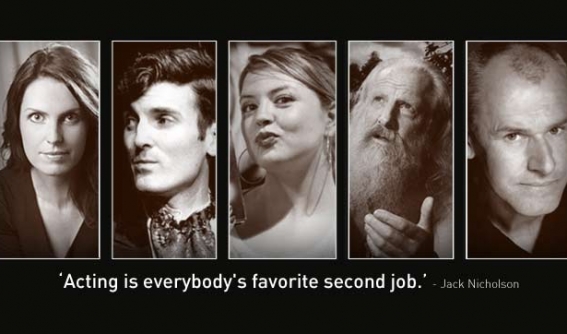
by SeanBreathnach | Aug 1, 2012 | Acting, Education, featured
A Conversation With Cork Based Actors
This week we interviewed some local actors to get their take on the short film scene, and to find out what makes them tick.
The actors we interviewed are:
[image_frame style=”framed_shadow” align=”left” height=”160″ width=”200″]http://egomotion.net/wp-content/uploads/2012/07/ruth-hayes-headshot-bw-medium-199×300.jpg[/image_frame]RUTH HAYES:
Ruth studied drama with LAMDA, here in Cork. She went on to study screen acting in both Cork and Dublin with the Irish Film Academy and with award winning writer and director Terry Mc Mahon. She has appeared in numerous performances on the Cork stage over the years, including Dancing at Lughnasa, The Country, A Serving of Pinter, Playboy of the Western World and Tons of Money. Her musical theatre credits include the lead characters in Guys and Dolls and My Fair Lady. On Screen, Ruth has featured in several short films including, Partly Cloudy, Th3 Room, Searching for Ten, Grief and Dying Wish. Ruth also played the lead character in the independent feature film The Far Road. http://osullivantheactorsagent.com/?p=396
[image_frame style=”framed_shadow” align=”right” height=”160″ width=”200″]http://egomotion.net/wp-content/uploads/2012/07/jrh.jpg[/image_frame]
JOHN RYAN HOWARD:
John graduated from Kinsale College and has also trained under Hollywood’s top Acting coach Margie Haber of Margie Haber Studios, Los Angeles. He has performed leading roles in over 50 Short Horror & Comedy films.
John’s work on stage has ranged from Irish classics such as Brian Friel’s ‘Translations’ whereby he played the leading role of ‘Owen’ to farce comedy’s such as ‘A Flea In Her Ear’ whereby he played the role of ‘Etienne'(a role made famous by Sir Anthony Hopkins).
John’s latest performance as ‘Lord Henry Wotton’ in a stage adaptation of Oscar Wilde’s ‘The Picture of Dorian Gray’ (July 2012) earned him critical acclaim.
http://www.imdb.com/name/nm3319585/
[image_frame style=”framed_shadow” align=”left” height=”160″ width=”200″]http://egomotion.net/wp-content/uploads/2012/07/CC-247×300.jpg[/image_frame]
CATHERINE CROWLEY:
When Catherine was growing up she wanted to be either an actress or a nun! Thus far the acting is winning that rivalry. If there is any aspect film-making, be it performing, sourcing props, clapper board, or even making the tea, there is nowhere she’d rather be. This is her passion.
Catherine studied acting in the School of Music and the Actors Space in Vic, Spain. She has been involved in several productions including ‘Baby Boots’ [dir. Dan O Connell], ‘Flipping Channels’ [dir. Fiona Riodan] and most recently ‘Partly Cloudy’ [dir.. Mark Cogan]
http://catherinecrowley.webs.com/
[image_frame style=”framed_shadow” align=”right” height=”160″ width=”200″]http://egomotion.net/wp-content/uploads/2012/08/534181_10150910420164219_1680869318_n.jpg[/image_frame]
FRANK HURLEY:
Frank Hurley starred in the lead role in the recent award winning short film “A Selfless Act”. Prior to this he has acted in several short films which have been screened in film festivals at home and abroad. Frank hHas also turned his hand to producing and has produced his last three films, ‘Baby Boots’ Twinkle Toes’ and ‘A Selfless Act’.
http://www.imdb.com/name/nm3810877/
[image_frame style=”framed_shadow” height=”160″ width=”200″]http://egomotion.net/wp-content/uploads/2012/07/SOC.jpg[/image_frame]STEPHEN O’CONNOR:
Stephen studied acting in The Gaiety School Of Acting and St John’s College, Cork after which he went on to act in over a dozen short films including The Lump (RTE / Ed Godsell) and The Legend Of Jonny King (Stormlight Productions). He has starred in Fair City and other RTE productions.
http://www.imdb.com/name/nm3734338/resume
The Interview:
1. What is the best part of the job?
Catherine: The best part to the job is meeting and working with people brimming with enthusiasm and talent. Being part of a friendly and passionate group also makes it not seem like work at all.
Ruth: I love getting to be someone else! I enjoy reading a script and discovering who the character is. Working out what makes them tick and how they respond to certain situations. Really getting under their skin. I’m obsessed with human behaviour, so the opportunity to play different characters in a disparity of situations is what I love most.
Stephen: Going home at the end of the day knowing that you did the best you could.
John: Personally, when you find a role that suits you perfectly where you have the opportunity of using your own unique qualities that colour a character uniquely. Particularly on stage where you have the opportunity of being in character for a long period in front of an audience playing a lead role where you really grow into a role organically. And not to mention the fantastic craic you have during a run of a show, mostly with an ensemble cast. Due to the long period of time you spend with a cast and crew on a show, everybody becomes very attached to each other in a good way.
Frank: I suppose I’ve lived in a fantasy land all my life, I think its fair to say I’m not in touch with reality at all, at all, and acting allows me to live out some of those fantasies briefly.
2. What is the worst part of the job?
John: The ruthless business side of acting. How hard it is to get seen whether it be on stage or screen, just to get Casting directors to watch any of your material or to come to a live performance. Most jobs in Cork or indeed Ireland are unpaid acting jobs so it makes it very hard to support yourself when you are committed full-time. Auditions also tend to be a horrible experience for most actors, particularly when you don’t get a fair opportunity to show your potential for the given audition due to a lack of understanding about acting or actors.
Catherine: I suppose the instability of the business. It’s always tough when your not sure when the next job is coming.
Stephen: Going home at the end of the day knowing that you didn’t do the best you could.
Frank: Getting nowhere fast!
Ruth: The uncertainty, for sure. It’s not the kind of job where you train and hone your craft and then opportunities will follow suit. You’re not afforded the luxury of that kind of career trajectory. You can have times when you’re constantly working, then times when you hit a dry spell. It really can be a feast or a famine. You need a lot of determination to stick at it in those quieter times.
3. What advice would you have for anyone who wants to get into acting for screen?
Catherine: Less is more. The camera picks up everything, it is totally different to acting on stage. The camera captures thoughts so the smallest glance will mean a lot. Keep going to acting classes/courses as you can always learn more. The day you stop learning is the day you die.
Frank: Don’t try doing it off the cuff like I am, go to drama school and do it the professional way.
Stephen: Take a screen acting course and act in as many student films as you can. Student films are a great way to gain experience.
Ruth: Firstly, I would advise on doing a course in screen acting. There are so many great courses and workshops in acting for camera. It’s a completely different discipline to theatre acting. Yes you’re still doing your scene breakdown and character study but the delivery is very different. A lot of these courses will show you how to deal with life on set etc. Many of them will record you acting on camera. Even though it can be a cringe worthy experience, it’s invaluable for highlighting little habits that you may have that you need to kick when acting for screen. Once you have that done, then go and get the experience. Send your CV into St. John’s central college here in Cork and put yourself forward for as many short films as you can. Keep an eye out online for opportunities also. Of course Egomotion is a great place to get to know people and find out what’s happening. Fellow actor Marcus Bale also runs the Irish bulletin for actors and actresses, on facebook, so make sure you join that too!
John: Get as good a showreel as you can get, ideally by finding duologues where you can be seen to be clearly working off another actor, actively listening, clearly in the moment with a substantial amount of reaction shots of you. As the saying goes acting is re-acting. And to have as good a contrast as you can both drama and comedy to show as much of a range as you can manage.
4. What was the biggest challenge you faced in your most recent film?
Stephen: Trying to remember that “LESS IS MORE”!
Catherine: Honestly, Heels. It can be hard working in costume for the whole day on set. Particularly if you haven’t broken them in beforehand!
Ruth: Falling forward on cue and making it look natural!!
Frank: The last film i did I played the part of a down and out. A real life homeless person approached me as if I was living rough and tried to give me some advice, I found it very hard to admit to this person I was only acting a scene so I stayed in character rather than embarrass him. There were also lots of times when people would throw me some money and it was also difficult to stay in character on those occasions so as I wouldn’t embarrass myself.
5. What advice would you have for movie directors when directing actors?
Ruth: I love to have an open dialogue with a director. I have always seen movie making as a collaborative process so I guess I’d advise a director to be open to suggestions by an actor and allow them the freedom to make choices in a scene. This is all within reason though and it’s important that the actor doesn’t go off on a tangent and veer from the essence of the character and the script. Good communication skills are vital here.
Frank: Give the actor direction! A lot of directors would leave it to your own interpretation, I personally think it would be easier for me if the director explained to the actor the story that was being played in his head but then, if I knew what to tell a director to do, then I’d be a director myself.
John: Be clear on what you want from the actor but trust the actor enough to do his/her job. Great directors, I think, give just enough guidance for you to fufill the requirements of a role without dictating the performance or restricting the actors’ own creative process.
Stephen: Listen to your actors before you shout “Action”.
Catherine: Everyone is different so it’s hard to say one thing that will work for everyone.
‘Communication is key’ – I know its a totally over used phrase but it is also very true. Be clear with how you want a scene to be, but be open and receptive to how the actor interpreted the script. This is why I personally think having rehearsals before going to set is a massive advantage. Also using storyboards in preproduction is quite helpful as you see what the director has envisaged and discuss it with them.
6. Who would you say are your biggest inspirations in the film world?
Frank: I’ve always admired the acting of Mel Gibson and Tom Hanks.
John: Al Pacino, Anthony Hopkins, Kevin Bacon, Colin Farrell, Gabriel Byrne.
Stephen: Gabriel Byrne and the late Donal McCann.
Catherine: Hard question as there are so many…
Males: Robert Di Nero, Al Pacino, Peter Ustinov, Dustin Hoffman.
Females: Maggie Smith, Meryl Streep, Michelle Pfeiffer, Sally Field.
Ruth: It’s really difficult to single anyone out. The people that inspire me are those who are not afraid to take risks, be it an actor, director or writer. Those who make the brave choices and see the job through. It’s tough to get projects made at times, so I have great admiration for those who have the vision and chutzpa to see a production come to fruition. Because we are such a small country, I always feel inspired and have a sense of pride when I see ‘our own’ doing well.
7. Are there any particular roles that you relish, or that you would love to get your teeth into?
Stephen: Dracula.
Frank: I’ve always fancied the idea of being a renegade soldier in a war movie but I’d also love to get into more comedic roles, so if there are any good directors out there with comedy war movies give me a shout.
Ruth: I’m delighted to say that I’ve played a good cross section of characters over the years. I’ve gone from drama to comedy to horror! However I’d love to get my teeth into a great action role. I’ve played the victim a lot so the chance to play a strong woman who can kick butt sounds like fun!
John: Well recently having played ‘Lord Henry’ in Oscar Wilde’s ‘The Picture of Dorian Gray’ directed by Cal Duggan for Kinsale Arts Week, I found it to be the role of a lifetime that suited my own unique quality of humour and found a substantial amount of personal parallels with the character that gave me a very specific avenue into the role and gave it 3 dimensions for me as a result. It was the best acting I’ve ever done as a result and those familiar with my work concurred. It just goes to show when you get THAT role that’s made for you.
Catherine: I want to do it all!! I never want to be typecast. However in saying that, villains appeal to me. When I was small I was always more fascinated with Maleficent and Ursula the Sea Witch than I was with Sleeping Beauty or Ariel. I love evil characters who are more fleshed out, relate able and fun.
8. What is your impression of the film industry in munster, and in particular in cork at present?
Catherine: I know it’s been said before in the other interviews on Egomotion but we can all feel a change at the moment. The Cork film scene is buzzing, gaining momentum and popularity. Our hope is that soon Cork will be one of the top spots for film companies to come and work in. We have hard working, talented people in Cork. We just need the funding so these people don’t have to move elsewhere to get steady work in our industry.
John: I think there is an incredible wealth of talent that has to break through at some stage, but something needs to happen for that to occur and I’m not so sure what that is yet.
Frank: Non existent.
Stephen: A sleeping Giant that is about to awake.
Ruth: Well there certainly is a buzz around Cork film making at the moment. It’s about time too. As part of this job I have to travel up to Dublin a lot. It’s nice to know that things are beginning to happen down here. There’s such a wealth of talent and experience amongst the film community here in Munster. What I love most about the community down here, is that people are extremely supportive of each other. There’s a sense of comradery and good will. We’ve all helped each other out in different projects over the years. Long may it continue to flourish.
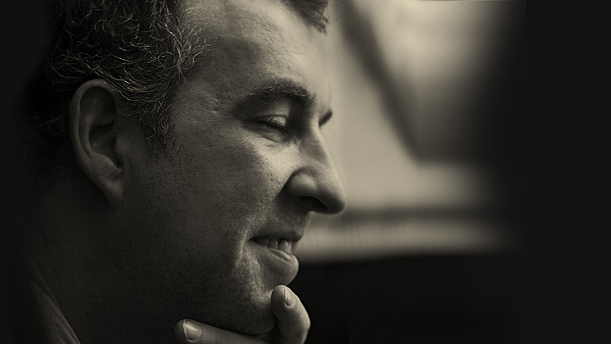
by SeanBreathnach | Jul 5, 2012 | Cinematography, Education, featured, Short film
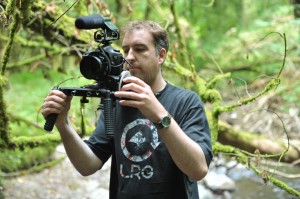
This week we interviewed one of the hardest working camera operator’s and D.O.P.’s in Cork, Paraic English.
Páraic has worked as DOP on dozens of films, including ‘Hungry Hickory’ (Short Film, Dir. Damien McCarthy) and ‘Penny’ (Short Film, Dir. Patrick O’Shea). He has shot and edited short films, documentaries, adverts, stock and catalogue Shoots in Ireland and abroad. A comprehensive list of credits can be seen on his IMDB page: http://www.imdb.com/name/nm3279826/
Every time I attend a film festival in Munster I see your name on films. Have you worked with everyone in Cork at this stage?
Nope. Cork is so small, crews and cast often overlap over different projects. It’s good for continuity and building working relationships but at the same time I’m always happy to hear new ideas from ‘strangers’ or strange ideas from ‘newbies’.
Are you shooting something at the moment? Can you tell us a little about it?
Ya always working away on something thankfully, it’s wedding season! I enjoy doing short promos, most recently one for an Opera Production, part of the Midsummer Festival. We have some scenes left to shoot for Kevin O’Neill’s upcoming short film too and a trip to the west of Ireland is in the offing soon too to shoot the CFC/RTE Short Script Award Film ‘Leanbh’. Other than that I’m kept busy freelancing for production companies grabbing B-Roll, talking heads and sunshine shots for corporate and event films. Trying to get my head around motion-controlled timelapse for a wee trip in August too. It’s complicated and I don’t have a head for figures.
How important is the script to you?
It’s the blueprint for months of planning and effort as far as production crew are concerned. However, there’s so much room between the words for actor performance, score, camera and pacing that I’m often thankful I’m only a techie. I rarely read it more than twice.
What is your favourite part of the job?
Apart from the early starts and late finishes? Eh, editing. That’s where it all comes together. You do get to see some cool stuff now and again. Film is something that can bring people together so that’s nice to be a part of.
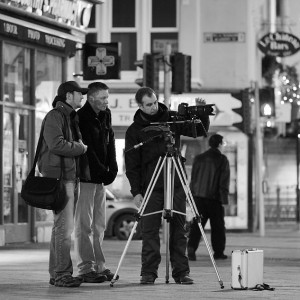
What is the worst part of the job?
Multi-tasking. Keeping an eye on light continuity, eyelines, shooting for the edit, boom in shot, makeup, shadows, composition, moving the camera, the other cameras, unravelling the slate notes. You get the idea. You’d be knackered after it.
Who would you say your biggest inspirations are in film?
Werner Herzog, Roy Andersson, Robert Altman, Hitchcock, Fellini (for the madness and the moving camera), Scorsese, Orson Welles for Lady From Shanghai alone, I’m partial to a bit of Terence Malick too. Anything Jack Cardiff shot. I like the stylistic touches of Jean Pierre Jeunet & De Palma too sometimes. Roger Deakins is a great storyteller and shares lots of his techniques online too which is great for anyone with an interest. Laurel & Hardy films are always a winner.
What was the biggest challenge on your most recent film? Do you find the same challenges coming up again and again?
Ya always the same challenges. Smaller budgets mean short shoots in locations that often can’t be modified or adequately lit and sadly the lack of technical prep time can have consequences. Compared to the challenges of the production team they pale – everyone does the best they can with what they got. I have lots of admiration for anyone who actually makes a film, it takes a lot of guts.
How much have things changed in your line of work in the last ten years?
Very little. It’s more affordable in some ways to get a good image onscreen but a good story well told will never change. The internet is probably the greatest change. New market and a whole new set of imponderables.
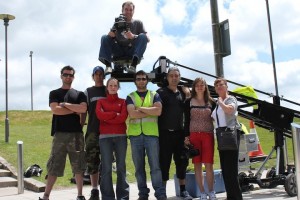
Have you particular advice to give amateur film makers regarding camera work and lighting in their movies?
Fix it in post.
What do you think of the condition of filmmaking in Cork at the current time?
I’m optimistic. In the past, scripts may have fallen by the wayside but there now seems to be an appetite and personnel to see through projects to a high standard. Lots of distinctive original voices coming through. Ireland is a cinema-loving and cinema-literate nation. My wish would be that this would continue so we can make our mistakes now and if funding materialises in the future we’ll be in a better position to deliver something we can be proud of.













